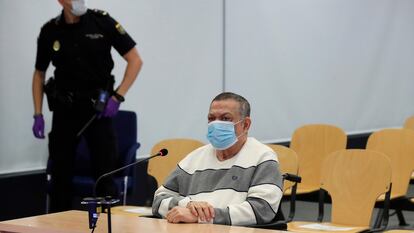Spanish court sends ex-colonel to prison for 1989 Jesuit killings in El Salvador
Over three decades after a massacre that drew international attention, Inocente Orlando Montano was found guilty of “terrorist” crimes

The relatives and colleagues of the Jesuit priests who were murdered in El Salvador in 1989 had been waiting for three decades to hear the word: “Guilty.”
On Friday, nearly 31 years after the killings, a panel of judges at Spain’s High Court (Audiencia Nacional) sentenced former colonel Inocente Orlando Montano to 26 years, eight months and one day of prison for each one of the five Spanish priests who were assassinated, for a total penalty of 133 years, four months and five days.
Montano, who also served as vice-minister of public security during the country’s 1979-1992 civil war, had been accused of participating in the design and execution of the plan that ended with the deaths of six priests and two women at Central American University (UCA). One of them was the university rector, Ignacio Ellacuría, a prominent figure of Liberation theology who defended dialogue between the guerrillas and the government.
During the trial, Montano initially said that he had no ill feelings toward the Jesuit priests, but later accused them of supporting a coup against the ultraconservative government
Five of the victims were Spanish nationals, and the case was handled by the justice system in Spain. On Friday, the court found Montanto responsible for “terrorist” crimes.
The historic ruling states that the perpetrators of the massacre acted “when they perceived threats against their power and control in the military, political, social and economic spheres of the country.” They also “gave a direct order” to “execute Ellacuría and leave no living witnesses.” The events are described by the ruling as “state terrorism.”
Spanish public prosecutors and the Pro Human Rights Association of Spain, which filed a private criminal complaint over the slayings along with the Center for Justice and Accountability (CJA), had focused their accusation on Montano, who is now 77.
The former Salvadoran commander has been described as a prominent member of La Tandona, a graduating class of far-right army officers who held key positions in the army and in government. He was allegedly part of a group of officials who gave the orders to kill the Spaniards Ignacio Ellacuría, Ignacio Martín-Baró, Segundo Montes, Amando López, Juan Ramón Moreno, as well as the Salvadoran priest Joaquín López, the cook Elba Ramos and her daughter Celina.
During the trial, Montano initially said that he had no ill feelings toward the Jesuit priests, but later accused them of supporting a coup against the ultraconservative government of El Salvador in 1979. He also said they were meeting with, and backing, the guerrilla group Frente Farabundo Martí para la Liberación Nacional (FMLN).
Montano fled to the United States, which extradited him to Spain in November 2017 after a long legal battle that began in 2011 when a Spanish judge charged him and others with murder. The former Salvadoran official had been living in Boston since 2001.
He was placed in pre-trial custody by Judge Manuel García-Castellón of Spain’s High Court, who noted that just days before the multiple murders, Montano had used the state radio network to issue death threats against the victims.
English version by Susana Urra.
Tu suscripción se está usando en otro dispositivo
¿Quieres añadir otro usuario a tu suscripción?
Si continúas leyendo en este dispositivo, no se podrá leer en el otro.
FlechaTu suscripción se está usando en otro dispositivo y solo puedes acceder a EL PAÍS desde un dispositivo a la vez.
Si quieres compartir tu cuenta, cambia tu suscripción a la modalidad Premium, así podrás añadir otro usuario. Cada uno accederá con su propia cuenta de email, lo que os permitirá personalizar vuestra experiencia en EL PAÍS.
¿Tienes una suscripción de empresa? Accede aquí para contratar más cuentas.
En el caso de no saber quién está usando tu cuenta, te recomendamos cambiar tu contraseña aquí.
Si decides continuar compartiendo tu cuenta, este mensaje se mostrará en tu dispositivo y en el de la otra persona que está usando tu cuenta de forma indefinida, afectando a tu experiencia de lectura. Puedes consultar aquí los términos y condiciones de la suscripción digital.








































